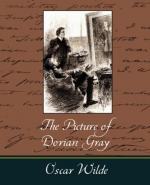He, at any rate, had no cause to fear that. The boyish beauty that had so fascinated Basil Hallward, and many others besides him, seemed never to leave him. Even those who had heard the most evil things against him (and from time to time strange rumors about his mode of life crept through London and became the chatter of the clubs) could not believe anything to his dishonor when they saw him. He had always the look of one who had kept himself unspotted from the world. Men who talked grossly became silent when Dorian Gray entered the room. There was something in the purity of his face that rebuked them. His mere presence seemed to recall to them the innocence that they had tarnished. They wondered how one so charming and graceful as he was could have escaped the stain of an age that was at once sordid and sensuous.
He himself, on returning home from one of those mysterious and prolonged absences that gave rise to such strange conjecture among those who were his friends, or thought that they were so, would creep up-stairs to the locked room, open the door with the key that never left him, and stand, with a mirror, in front of the portrait that Basil Hallward had painted of him, looking now at the evil and aging face on the canvas, and now at the fair young face that laughed back at him from the polished glass. The very sharpness of the contrast used to quicken his sense of pleasure. He grew more and more enamoured of his own beauty, more and more interested in the corruption of his own soul. He would examine with minute care, and often with a monstrous and terrible delight, the hideous lines that seared the wrinkling forehead or crawled around the heavy sensual mouth, [66] wondering sometimes which were the more horrible, the signs of sin or the signs of age. He would place his white hands beside the coarse bloated hands of the picture, and smile. He mocked the misshapen body and the failing limbs.
There were moments, indeed, at night, when, lying sleepless in his own delicately-scented chamber, or in the sordid room of the little ill-famed tavern near the Docks, which, under an assumed name, and in disguise, it was his habit to frequent, he would think of the ruin he had brought upon his soul, with a pity that was all the more poignant because it was purely selfish. But moments such as these were rare. That curiosity about life that, many years before, Lord Henry had first stirred in him, as they sat together in the garden of their friend, seemed to increase with gratification. The more he knew, the more he desired to know. He had mad hungers that grew more ravenous as he fed them.




